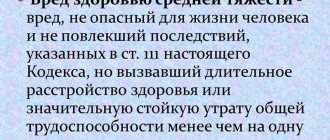- home
- Services
- Criminal proceedings
- Professional defense in court by a lawyer
An unlawful act, which is classified as unintentional infliction of grievous bodily harm, entails criminal liability. During the investigation, it is necessary to establish two main points: what harm was caused to the health of the victim, and whether there was intent on the part of the criminal. If we are talking about the absence of intent and grievous harm, then the punishment is established in accordance with the norms of Art. 118 of the Criminal Code of the Russian Federation .
What is grievous harm?
All consequences of harm to health, which can be identified as serious, are considered in Art. 111 of the Criminal Code of the Russian Federation . The law includes:
- loss of one of the senses of touch;
- loss of ability to speak;
- organ loss or failure;
- abortion;
- the appearance of mental disorders, drug addiction;
- facial disfigurement;
- loss of ability to work by 1/3 or more, or complete loss of the opportunity to continue working in one’s profession.
All these consequences can only be established by a physician, who must reflect his findings in the conclusion. Sometimes it is necessary to conduct a medical examination to establish not only the presence of serious harm to health, but also the relationship between the act of the accused and the manifestation of the consequences. For a victim who wants to impose a proportionate punishment on his offender, he may need a private lawyer in Moscow who will pose the right questions to the expert to prove the presence of, albeit unintentional, infliction of serious harm to health.
Expectations and reality: compensation for moral damage in Russian courts
Expectations
The Commission on Determining the Amount of Compensation for Moral Damage at the Russian Lawyers' Association and the Financial University under the Government of the Russian Federation conducted a sociological study on Russians' assessment of the amount of fair compensation for moral damage in the event of harm to health or loss of loved ones. More than 600 people from 70 Russian cities took part in the survey. It turned out that the estimate of fair compensation for moral damage and suffering of victims varies from 2.55 million to 17.11 million rubles. (depending on the type and circumstances of the case).
The average estimate of fair and sufficient compensation for moral damage and suffering of victims, according to Russians, is 8.77 million rubles.
When assessing, respondents paid attention to the circumstances of the damage, so the variation in the amount of compensation, depending on the situation, was significant. Respondents estimate the largest amount of compensation for moral damage in the event of the death of the only child in the family - 17.11 million rubles, as well as in the case of severe injury with loss of ability to move - 15.63 million rubles. The amount of moral damage in stories that did not result in serious harm to the health of the victims is estimated at smaller amounts.
For moral damage they propose to introduce lifelong compensation
The amount of fair compensation indicated by survey participants is comparable to compensation awarded in similar situations in foreign jurisdictions. Thus, according to statistics, Russian courts in favor of a person forever deprived of the ability to move, recover on average 500,000–700,000 rubles, but not more than €10,000. Moreover, in Italy, compensation reaches €2 million, in Germany, England and France from €300,000 to €700,000, that is, the volume of penalties can vary by 30–200 times.
The assessment of fair compensation differs among different population groups. Thus, men value compensation at a higher amount than women. People over 60 years of age tend to estimate moral harm at a lower amount than Russians aged 18 to 50 years (7.5 million rubles versus 8.98 million rubles for respondents aged 50–60 years and more than 9 million for respondents under 50 years old ). Freelancers and specialists in private practice, as well as managers, consider higher payments sufficient than those who do not hold management positions (RUB 17–20 million versus RUB 10 million). The most modest compensation is considered fair by military and law enforcement officials (4.56 million rubles), but this is a significantly larger amount than is awarded in practice.
Reality
Estimates of the amount of fair compensation given by citizens differ significantly from what can actually be obtained in court. According to statistics from the Judicial Department of the Supreme Court, the average amount of compensation for moral damage for damage to human life and health was 81,707 rubles. in civil disputes. In criminal cases, the amounts collected are higher, but the difference is not very significant, although there are no official statistics on this matter.
According to statistics from the Suddep, an average of 111,000 rubles is paid for the death of a Russian, and the median value is even less - only 70,000 rubles. In case of disability, the average compensation is slightly more than 193,000 rubles. (median value – 140,000 rubles).
- AIDS by mistake: who will pay for an incorrect diagnosis
August 2, 18:31 - Payment for error: record compensation awarded for incorrect actions of doctors
May 29, 20:43
The main problem in Russia is the lack of uniform guidelines for determining the amount of compensation for moral damage, experts admit. While in the West and the United States there is a method for calculating compensation, it is absent in Russia. The result is that practice varies significantly by region. The difference in the amounts awarded in similar cases can vary hundreds or even thousands of times. The outcome of consideration of such a claim depends both on the judicial discretion and on the resonance around the case. For example, the claims of victims of the fire in the Winter Cherry shopping center, the total amount of which, as reported by the Investigative Committee, exceeded 2.9 billion rubles.
“The main trend in the courts, in my opinion, is the price equalization of cases and different situations, unmotivated amounts, and reluctance to go beyond the established judicial practice. For example, it is sometimes difficult to understand why the court recovers for harm to the health of a pedestrian who was injured through his own fault and grossly violated traffic rules, an amount that is almost the same as in the case of an injury at work, for which the worker is not at all to blame,” says Irina Fast , Chairman of the ALR Commission, lawyer, representative of South Ossetia Civil compensation Civil compensation Regional rating. .
Minister of Justice Alexander Konovalov and Chairman of the Council of Judges Viktor Momotov publicly spoke out about the unacceptability of meager compensation and the need for change (for more details, see the material “Issues of compensation for moral damage were discussed at the Zamyatnin Club”). But so far the situation has remained virtually unchanged.
“High compensation figures - from a million rubles - is a kind of feat for a judge, especially in the regions,” admits Irina Fast.
She gives an example: at a recent law enforcement forum, in response to a question from the audience about moral damages and the reason for meager compensation, the answer was given that it is impossible to recover a lot, for example, from hospitals, since this will lead to their ruin. “But then what about people who remain disabled for life or lose their loved ones?” – Fast asks.
Cases on compensation for moral damage in Russian courts
1. The case from St. Petersburg about medical error, the decision on which was made back in 2012, remains a record for the amount of compensation for moral damage. 15 million rubles were recovered from the hospital (First St. Petersburg State Medical University named after academician I.P. Pavlov). for medical error during childbirth, which led to the death of the child and harm to the health of the mother.
2. Compensation in the amount of 5 million rubles. was prescribed to a father with many children, whose wife died as a result of an anesthesiologist’s mistake during a caesarean section. The defendant in the case was Maternity Hospital No. 6 named after. V.F. Snegirev in St. Petersburg.
3. At 1.3 million rubles. The court appreciated that the patient had a healthy kidney removed at the Sakhalin Regional Hospital. The examination showed that the woman underwent surgery without sufficient grounds, during which a healthy organ was damaged and had to be removed. The medical institution appealed the first instance decision on compensation in the Sakhalin Regional Court, but to no avail.
4. The appellate court changed the decision in the case of freestyle skier Maria Komissarova, paralyzed at the Sochi Olympics, who was undergoing rehabilitation at the clinic of Dr. Evgeniy Blum. The girl spent 51 million rubles on treatment, but did not receive the promised recovery and filed a lawsuit. The first instance decided that 40,000 rubles would be sufficient compensation for her. But on appeal they decided that fair compensation was 2 million rubles. Also, the St. Petersburg City Court fined the clinic 1 million rubles, but refused to return the money spent on treatment.
5. One of the recent cases considered by the Supreme Court is indicative: the Supreme Court indicated that if a child was injured, then compensation cannot be reduced, even if he himself was to blame for what happened (for more details, see the material “The Supreme Court awarded multimillion-dollar compensation for moral damage”). The definition can be considered significant, since it clearly indicates the inadmissibility of reducing the amount of compensation for minors if they are at fault in an accident. Previously, practice was different, which led to a reduction in monthly payments for compensation for damage to health by 50% and even 90%.
Today, the ALA commission on determining the amount of compensation for moral damage has developed the first proposals for a methodology for determining the amount of compensation for moral damage, which is based on the requirements of national legislation and foreign experience.
“We propose to establish a basic amount of compensation for the most severe case, as recognized in all jurisdictions, for “tetraplegia.” This is paralysis of all limbs with preservation of brain activity, and then to this size apply coefficients that take into account the degree of damage, guilt, circumstances of the incident and the individual characteristics of the victim,” says Fast. To verify the adequacy and reasonableness of the proposed methodology, surveys are conducted both among the general population and among representatives of the legal community.
Other
Lack of intent
The subjective side of the crime under discussion is expressed precisely in the absence of intent when committing an act or inaction. That is, the harm must occur due to the negligence of the offender. By his frivolous or careless actions, he brought upon the victim serious problems in his health. Moreover, frivolity is manifested in the fact that the person foresaw the consequences of his actions, but at the same time arrogantly counted on preventing them. We can speak of negligence if a person did not foresee the consequences, but if he had shown forethought, he would have been able to understand what his actions were leading to.
The described article does not cover cases of innocent causing of harm. Here the behavior of the accused borders on criminal negligence . The main difference is that the person could not foresee the consequences of his actions.
Step-by-step instruction
In order to receive compensation for moral damage, you need to file a claim as part of a criminal proceeding or separately based on the results of recognizing an accident at work. If there was a simultaneous material loss, it is permissible:
- combine penalties for moral and material damage in one application;
- file two claims at the same time;
- bring claims at different times, independently of each other.
Jurisdiction
The indicated issue is resolved in a court of general jurisdiction of the first instance at the place (district) of the defendant’s residence in accordance with, or at the place of consideration of the criminal case. In a criminal case, a claim may be filed in the following order:
- simultaneously with the consideration of a criminal case;
- after the court decision is made, based on the extract received.
Statute of limitations
The general limitation period according to Article 196 of the Civil Code of the Russian Federation is 3 years from the date of receipt of average harm to health. In such matters, the statute of limitations is canceled if previously caused harm has become the cause of new grave circumstances. For example, the consequences were felt after several years and led to a chronic illness, constant pain or loss of ability to work.
Article 196 of the Civil Code of the Russian Federation. General limitation period
- The general limitation period is three years from the date determined in accordance with.
- The limitation period cannot exceed ten years from the date of violation of the right for the protection of which this period was established, except in cases established.
However, to extend the period, it will be necessary to restore the cause-and-effect relationship and prove that the cause lies in previously received injuries.
Features of drawing up an application
Recovery is required by a statement of claim drawn up in the form established. The header of the application is drawn up according to the general form. Name of the document: “Statement of claim for recovery of moral damages for causing harm to health of moderate severity.”
The cost of the claim is indicated at the very beginning of the document, after its name. It is entered in numbers and in words. After indicating the amount to be recovered, the main text of the application follows, which provides detailed and convincing justification for the legality of the recovery.
For your information! The text begins with the circumstances of the crime, or a description of the accident certified by the act.
Immediately you need to send a reference to the details:
- accident report;
- traffic police report on road accidents;
- materials of the criminal case;
- extracts from a court decision in a criminal case.
After this, a list of injuries received is given, indicating that they are characterized as harm to health of moderate severity. An appropriate link is provided to the conclusion of the Bureau of Medical Examiners and other documentation. The following text depends on the situation:
- It can begin from the moment the crime was committed or from the background of the incident, if this is related to the moral suffering of the plaintiff.
- You can succinctly list the injuries sustained and the amount of pain the plaintiff experienced.
- Be sure to focus on the abusive or negligent attitude of the perpetrator towards the victim.
After setting out the circumstances of the case, a petition to the court is formulated, which consists of a request:
- admit the claim;
- recover the amount of the claim from the perpetrator (indicate in numbers and words).
At the end, a date, signature and a list of attachments from among the documents that are attached as evidence are indicated.
- claim for compensation for harm to health of moderate severity and moral damage
- claim for compensation for harm to health of moderate severity and moral damage
Documents and evidence
Everything stated in the application must be supported by evidence. Evidence may include the following official documents:
- accident report;
- extract from the court decision;
- a certificate from the police department confirming the transfer of the criminal case to court;
- conclusion of the bureau of forensic examination;
- opinions of independent experts;
- extracts from the medical history;
- documents confirming the completion of psychological rehabilitation.
In addition, photographs and video materials, oral and written testimony can serve as evidence.
Attention! If the victim is in the hospital, he has the right to issue a power of attorney certified by the chief physician, transferring it to an authorized person. .
Participation of a lawyer in the defense of a person accused of causing grievous bodily harm through negligence
If it is not possible to prove that the principal was not involved in causing harm to the victim’s health, then a private lawyer in Moscow should focus on reclassifying the crime. The line between serious harm and moderate harm can sometimes be very blurred, and the issue is decided by a medical expert, whose conclusion, if there is justification, can be challenged.
The presence or absence of intent can also be played upon; the punishment for an intentional crime, a crime of negligence or for innocent causing of harm varies greatly. And even if there is no reason to change qualifications, you can insist on a less serious punishment under this article.
Return to Criminal Cases section
What affects the amount of compensation for personal injury?
When determining the amount of damage that the defendant must pay, the calculations do not take into account public and private payments required by law, unless they are made at the expense of the culprit of the negative event. The amounts of payments compensating for damage to health do not take into account and do not reduce the amount of compensation:
- all types of pensions and benefits, including disability benefits, assigned before and after the accident in question;
- income and earnings that the victim receives after the event.
A change in the volume and amount of payments by the culprit who caused harm to health is possible only upward if this is provided for by the contract or the law. If necessary, someone found guilty of causing harm to health must not only reimburse the victim’s expenses related to the consequences of his actions, but also provide an advance payment.
Such damage is possible when the victim, after causing bodily harm, is temporarily or for life deprived of the opportunity to earn his own income through his own labor. Or he is forced to constantly bear additional costs due to the consequences of this event.
Then the one who caused harm to health must provide the victim with maintenance, lifelong or temporary. The amount of maintenance must be no less than the losses that occurred as a result of health problems.





